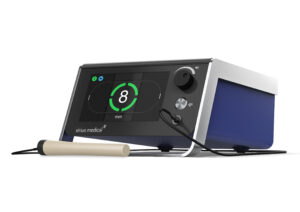Breast cancer surgery and procedures can be a life-altering event, making it essential to have a supportive team of experts. Evansville Surgical Associates are dedicated to assisting you every step of the way. Whether employing cutting-edge breast cancer surgery techniques or detecting early warning signs, our goal is to ensure you receive the necessary treatment and support.
Breast Cancer Surgery and Procedures in Evansville, IN
The dedicated surgeons at Evansville Surgical Associates provide the highest quality breast procedures and surgery in Evansville, Indiana, and the tri-state area. Our board-certified surgeons are committed to remaining at the forefront of surgical advances. This ensures that you receive the best possible care throughout the surgical process.
We offer a comprehensive range of procedures, from minimally invasive surgeries to complex interventions, tailored to meet individual needs. Embracing a multidisciplinary approach, we collaborate closely with various specialists involved in your care. This collaborative effort integrates the unique expertise of each specialist, contributing to a personalized treatment plan for optimal results.
Diagnostic Breast Procedures
Accurate diagnosis is pivotal for timely intervention. Diagnostic procedures such as mammography, breast ultrasounds, and MRI imaging help to detect abnormalities and guide medical decisions, ensuring comprehensive care.
Mammography
Mammography is a diagnostic imaging technique primarily used for breast cancer detection. It involves low-dose X-rays to create detailed images of the breast tissue. During the procedure, the breast is compressed between two plates to ensure optimal image quality.
Mammography is essential for early detection of breast abnormalities, including tumors or microcalcifications. Annual mammograms are particularly recommended for women over 40. They are recommended even earlier for women who are high risk, such as having a family history of breast cancer.
Mammograms aid in the early identification of potential malignancies, facilitating prompt medical intervention and enhancing the chances of successful treatment.
Breast Ultrasounds
Breast ultrasounds utilize high-frequency sound waves to produce detailed images of the breast tissue. This technique is often employed alongside mammography to evaluate abnormalities detected during screening. It’s non-invasive and most beneficial for distinguishing between fluid-filled cysts and solid masses, aiding in the diagnosis of breast conditions.
Breast ultrasounds are also valuable for assessing young women with dense breast tissue or offering additional information to complement mammographic findings. It is a dynamic tool for guiding biopsies and providing real-time imaging, enhancing the accuracy of breast cancer diagnosis and contributing to comprehensive breast health assessments.
MRI Imaging
Magnetic Resonance Imaging (MRI) is a non-invasive diagnostic procedure that employs powerful magnets and radio waves. These tools are used to generate detailed images of internal structures in the body.
This aids in the detection and characterization of various conditions, including:
- Tumors
- Injuries
- Neurological disorders
MRI imaging is employed for breast cancer screening in high-risk women due to its ability to detect lesions in dense breast tissue. It complements mammograms and ultrasounds, offering a more comprehensive evaluation. In specific diagnostic scenarios, ultrasound and mammography may be preferred, but MRI is valuable for early detection in at-risk individuals.
Core Needle Biopsy
Core Needle Biopsy (CNB) is a diagnostic procedure used to obtain tissue samples from suspicious lesions or masses for detailed examination. It extracts cylindrical tissue cores from the targeted area. This provides more extensive samples than fine needle aspiration.
This procedure is crucial for:
- Determining the nature of a lesion
- Distinguishing between benign and malignant conditions
- Guiding treatment decisions
CNB offers a comprehensive and accurate approach to diagnosing various medical conditions. It’s typically guided by imaging techniques such as ultrasound, CT, or mammography. This allows for a precise diagnosis of abnormalities like tumors or breast lesions.
Surgical Biopsy
Surgical biopsy involves the surgical removal of a tissue sample for detailed examination. It is often performed when other less invasive methods, such as needle biopsies, are inconclusive or impractical. During the procedure, your surgeon will remove a portion or the entire suspicious tissue, which pathologists then analyze.
Sentinel Node Biopsy
Sentinel lymph node biopsy (SLNB) is a diagnostic procedure for cancer staging, particularly for breast cancer. It involves identifying and removing the sentinel lymph node, the first to potentially receive cancer cells from a primary tumor.
Typically guided by radioactive tracers or dyes, your surgeon locates and biopsies the node to assess whether cancer has spread beyond the primary site. SLNB helps determine the extent of disease involvement and informs treatment decisions, reducing the need for more extensive lymph node dissections. This targeted approach minimizes surgical impact and aids in planning personalized and effective treatment strategies.
Staging Procedures
Staging procedures for breast cancer involve a multi-faceted approach. To accomplish this, our breast cancer surgeons utilize advanced imaging techniques such as:
- PET scans
- Bone scans
PET scans, or positron emission tomography scans, provide valuable information about metabolic activity, helping to detect distant metastases. Bone scans are instrumental in identifying potential bone involvement.
Together, these imaging techniques contribute to a comprehensive understanding of the disease’s extent. They facilitate accurate staging and enable us to tailor appropriate and personalized treatment plans for you.
Sirius Pintuition
The Sirius Pintuition is one of the latest tools we use to locate tumors in the breast, offering wire-free navigation for early-stage breast cancer. Traditional wire insertion surgery can be invasive and painful.
In contrast, Sirius Pintuition employs a tiny seed at the tumor site, providing:
- Reduced pain
- Flexible scheduling
- Shorter wait times
- Less stress for patients
This innovative approach enhances surgical precision and aesthetics. Powered by GPSDetect, it offers intuitive navigational guidance through visual and audio feedback. The biocompatible titanium seed ensures longevity and accurate tumor localization.
Sirius Pintuition benefits patients and surgeons alike. Patients benefit from convenience, reduced hospital visits, and cosmetic advantages. Surgeons benefit from unrestricted incision choices and enhanced tumor removal precision.
Breast Surgery Procedures
For breast cancer surgery, a spectrum of procedures addresses diverse medical needs. From lumpectomy to mastectomy, each intervention serves a distinct purpose in treating conditions such as breast cancer. Breast reconstruction provides restoration while gynecomastia reflects the comprehensive nature of breast surgery in addressing health and aesthetic concerns.
Lumpectomy
A lumpectomy involves the removal of a tumor or abnormal tissue while preserving the breast. Typically recommended for early-stage cancers, it aims to excise localized abnormalities while sparing healthy breast tissue. Eligibility is often determined by factors such as tumor size and location. Recovery varies, but many patients quickly return to normal activities.
Potential side effects may include:
- Temporary discomfort
- Swelling
- Changes in breast appearance
Lumpectomy is often paired with radiation therapy. This offers a more conservative alternative to mastectomy, emphasizing both cancer eradication and breast preservation.
Mastectomy
Mastectomy, the surgical removal of one or both breasts, encompasses diverse types tailored to individual needs. Skin-sparing mastectomy preserves breast skin for improved cosmetic outcomes, while Nipple/areola-sparing mastectomy retains these structures for aesthetic reasons.
Surgeon recommendations hinge on factors like:
- Cancer stage
- Cancer location
- Overall health
This aims to balance cancer eradication with quality of life. Considerations for reconstructive surgery following mastectomy underscores the multifaceted nature of breast cancer treatment and patient-centric care.
Breast Reconstruction
Breast reconstruction aims to restore the breast’s appearance post-mastectomy. Immediate reconstruction occurs during the same surgery as mastectomy, streamlining the process.
Whether through implants or your natural tissue, consultations before surgery will include discussions involving your preferences, expectations, and available options.
This transformative procedure not only addresses physical restoration but also considers emotional well-being. Breast reconstruction emphasizes personalized care and patient involvement in decision-making for a more comprehensive and satisfactory outcome.
Partial Breast Irradiation
Partial Breast Irradiation (PBI) is a targeted technique that delivers radiation specifically to the area around a tumor site after breast-conserving surgery. Unlike whole breast radiation, PBI focuses on the tumor bed, reducing treatment duration. It’s an alternative approach that minimizes radiation exposure to healthy tissues.
PBI is suitable for select patients with early-stage breast cancer, meeting specific criteria such as tumor size and absence of lymph node involvement. This precision treatment offers convenience and reduced side effects, presenting a valuable option for eligible individuals seeking a more localized and efficient radiation therapy.
Other Services We Provide
Breast Navigators
Evansville Surgical Associates is committed to supporting breast cancer patients at every stage through our navigators program. These navigators, who are also cancer survivors, offer empathy and guidance throughout:
- Consultations
- Mammograms
- Surgery
- Financial inquiries
- Follow-ups
Navigators provide a reassuring presence during diagnostic reviews. They facilitate recommended tests, set up appointments, and ensure patients comprehend the significance of procedures. Their goal is to prepare and support you, emphasizing the importance of pre-op visits and recommended treatments.
High-Risk Patients
High-risk breast cancer patients are individuals with an elevated likelihood of developing breast cancer. Factors contributing to high risk may include:
- Specific genetic mutations like BRCA1 or BRCA2
- Advanced age
These patients require specialized attention. They may undergo more frequent screenings, genetic testing, and tailored treatment plans. All of these strategies serve to effectively manage and mitigate their increased risk of breast cancer.
Ready to take the next step?
Request an appointment!
Related Articles

Breast Cancer Surgery at Evansville Surgical Associates
Breast cancer is a life-changing event. If you receive a diagnosis, you want to know that you have a team of experts on your side. At Evansville Surgical Associates, we do everything we can to

Am I at Risk for Breast Cancer and What Can Be Done About It?
The risk of developing breast cancer can vary from person to person. However, there are some common factors that can increase your risk and a few that might surprise you. But more important than knowing

Women’s Health Month: Learn About Our New Breast Cancer Procedure
Surgical technology is always advancing to provide patients with more options, less pain, and less stress. At Evansville Surgical Associates, we strive to be early adopters of new technology in order to provide the highest

